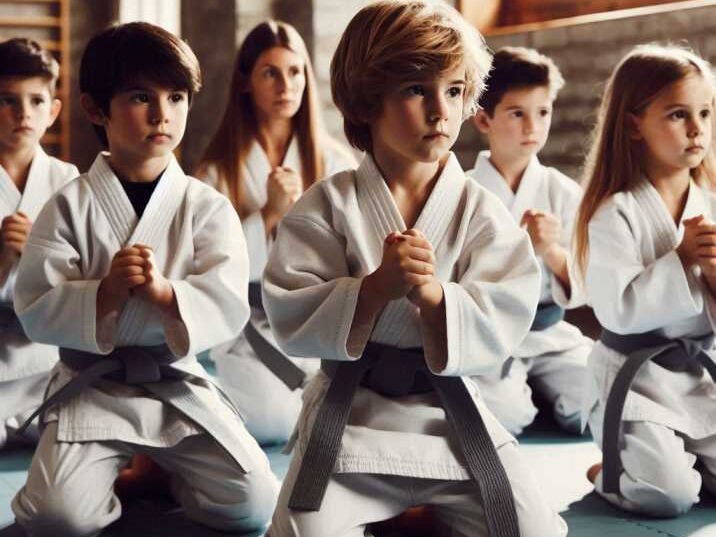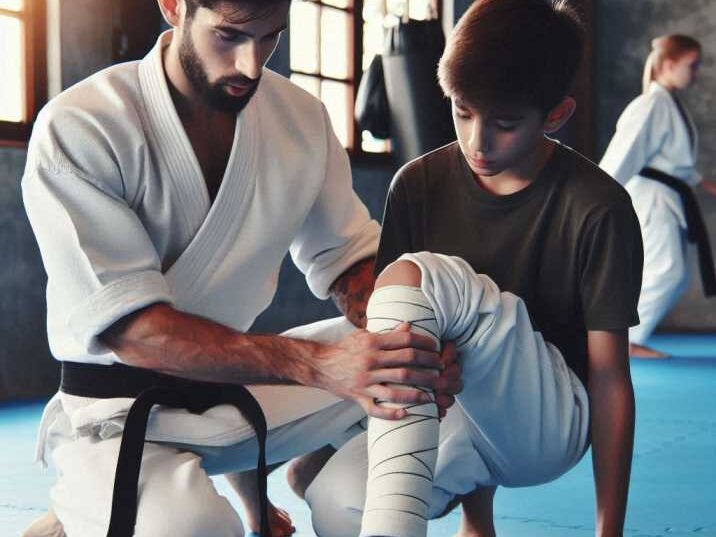Introduction
Table of Contents
Martial arts are more than just a way to learn self-defense. They are a powerful tool that can help children recover from injuries and improve their overall well-being. Many parents are curious about whether martial arts can help their children recover from injuries and how it might benefit them in other aspects of life, such as focusing better in school or improving their behavior. In this article, we will explore how martial arts training can aid in the recovery of childhood injuries, boost concentration, and teach valuable life skills. Whether your child is recovering from a sprained ankle, a broken arm, or just needs a bit more focus in their daily activities, martial arts might just be the perfect answer.

How Can Martial Arts Help with Childhood Injuries?
Martial arts provide a unique approach to rehabilitation and recovery. Unlike other forms of exercise, martial arts involve movements that are both gentle and strength-building, making them ideal for children recovering from injuries. Here’s how martial arts can help:
1. Physical Rehabilitation through Martial Arts
Martial arts training involves a variety of exercises that help improve strength, flexibility, and balance. These are crucial for children who are recovering from injuries such as fractures or sprains. Specific martial arts like Taekwondo and Karate focus on controlled, repetitive movements that can help rebuild muscle strength and joint mobility without putting too much strain on the injured area.
Benefits of Physical Rehabilitation through Martial Arts
- Enhanced Muscle Strength: Repetitive kicks, punches, and stances build muscle in a controlled way.
- Improved Flexibility: Stretching exercises incorporated in martial arts help in regaining flexibility, crucial for injured muscles or joints.
- Better Balance and Coordination: Balance drills improve proprioception, reducing the risk of future injuries.
2. Mental Resilience and Discipline
Recovering from an injury isn’t just about the physical aspect; it’s also about mental resilience. Martial arts require children to focus their minds and push through challenges, which can be incredibly beneficial during the recovery process. Training sessions encourage children to set goals, develop patience, and stay disciplined—all of which are critical skills when recovering from an injury.
Benefits of Building Mental Resilience
- Boosts Confidence: Overcoming physical challenges in martial arts helps boost self-esteem and confidence.
- Promotes Patience and Discipline: Following routines and mastering skills in martial arts instill discipline and patience.
- Encourages a Positive Mindset: Children learn to overcome pain and setbacks, fostering a more positive outlook on recovery.
How Martial Arts Improve Focus and Concentration in School
Apart from aiding in the recovery of physical injuries, martial arts also play a significant role in enhancing a child’s ability to focus and concentrate in school and other activities.
1. Mind-Body Connection
Martial arts require a high level of focus on both mental and physical actions. This mind-body connection helps children develop better concentration skills. During training, children must pay attention to their movements, listen to their instructor, and stay aware of their surroundings. These skills can easily translate into better focus in the classroom.
Benefits of a Strong Mind-Body Connection
- Improved Attention Span: Focusing on complex movements helps children develop longer attention spans.
- Enhanced Cognitive Skills: Learning sequences and memorizing patterns in martial arts can improve memory and cognitive abilities.
- Better Performance in School: The discipline and focus learned in martial arts often lead to better grades and classroom behavior.
2. Routine and Consistency
Martial arts training often involves repetitive routines that require focus and consistency. This practice can help children develop a routine in their daily lives, making them more organized and consistent in their schoolwork and other activities.
Benefits of Routine and Consistency
- Develops Good Study Habits: Regular martial arts practice can help children develop regular study habits.
- Encourages Time Management: Balancing martial arts with school teaches children to manage their time effectively.
- Builds Responsibility: Martial arts promote a sense of responsibility through regular attendance and commitment to practice.
The Role of Martial Arts in Preventing Future Injuries
Martial arts not only help in recovering from injuries but also play a significant role in preventing future injuries. The focus on strength, flexibility, and balance training helps build a more resilient body.
1. Building a Stronger Body
Regular martial arts training helps in building strong muscles and bones. It also improves flexibility, which can prevent common childhood injuries such as sprains or fractures.
Benefits of a Stronger Body
- Reduces Risk of Falls: Improved balance and coordination reduce the risk of falls.
- Prevents Overuse Injuries: Strength training prevents overuse injuries by strengthening muscles and joints.
- Encourages Proper Movement Techniques: Learning proper movement techniques reduces the likelihood of injuries during other sports or activities.
2. Teaching Proper Techniques
Martial arts emphasize proper techniques and postures, which can prevent injuries not just in martial arts but also in other physical activities. For example, learning how to fall correctly in martial arts can prevent serious injuries during playground activities or other sports.
Benefits of Learning Proper Techniques
- Reduces Risk of Injury in Other Sports: Proper movement techniques learned in martial arts help in avoiding injuries in other sports.
- Enhances Athletic Performance: Improved techniques lead to better performance in other sports or physical activities.
- Promotes Lifelong Physical Fitness: Learning safe techniques ensures children remain active and injury-free throughout their lives.
The Importance of a Supportive Environment in Martial Arts
The environment in which children learn martial arts is as important as the physical and mental benefits. A supportive and nurturing environment can greatly impact a child’s recovery and overall growth.
1. Supportive Instructors and Peers
Martial arts classes are typically led by experienced instructors who understand the needs of each child. These instructors provide personalized attention and ensure that each child practices safely, especially when recovering from an injury.
Benefits of Supportive Instructors and Peers
- Encourages Safe Practice: Instructors ensure children practice movements safely to avoid further injury.
- Builds Social Skills: Interaction with peers and instructors enhances communication and social skills.
- Fosters a Sense of Belonging: Being part of a martial arts group provides a sense of community and support.
2. Positive Reinforcement and Encouragement
Martial arts schools often use positive reinforcement to encourage progress and effort. This approach is beneficial for children recovering from injuries as it boosts their morale and encourages them to keep pushing forward.
Benefits of Positive Reinforcement
- Motivates Continued Effort: Encouragement from instructors and peers motivates children to continue working hard.
- Promotes a Growth Mindset: Positive reinforcement helps children develop a growth mindset, believing they can improve through effort.
- Improves Mental Health: Feeling supported and encouraged can improve a child’s mental health and well-being.
Table of Information about Can Martial Arts Help with Childhood Injuries?
| Benefits | Physical | Mental | Social |
|---|---|---|---|
| Rehabilitation | Improves strength, flexibility, and balance | Builds resilience and discipline | Enhances communication and social skills |
| Prevention of Future Injuries | Reduces risk of falls, teaches proper techniques | Encourages focus and concentration | Provides a supportive community |
| Improved Focus and Discipline | Enhances physical coordination | Improves cognitive abilities | Builds a sense of belonging |
Conclusion
Can Martial Arts Help with Childhood Injuries? Martial arts provide numerous benefits for children, especially those recovering from injuries. From physical rehabilitation to mental resilience, martial arts help build a stronger, more focused, and disciplined individual. Additionally, the skills learned in martial arts, such as improved concentration and proper techniques, can have lasting benefits in school and other activities. By providing a supportive and encouraging environment, martial arts can play a crucial role in a child’s recovery and overall development. If you’re looking for a way to help your child recover from an injury while instilling valuable life skills, consider enrolling them in a martial arts program.

FAQs
1. Can martial arts help a child recover from a broken bone?
Yes, martial arts can help in the recovery process by promoting gentle movements and exercises that strengthen the muscles around the bone and improve flexibility.
2. How does martial arts training improve focus in school?
Martial arts require concentration on movements and techniques, which helps children develop better focus and attention spans that can translate into improved performance in school.
3. Are there any risks associated with martial arts for injured children?
While there is always a risk of injury with any physical activity, martial arts training focuses on safe practices and proper techniques, which can minimize the risk of further injury.
4. Can martial arts prevent future injuries?
Yes, martial arts can prevent future injuries by improving strength, flexibility, balance, and teaching proper movement techniques.
5. What types of martial arts are best for children recovering from injuries?
Martial arts like Tai Chi, Judo, and Karate are great for children recovering from injuries as they focus on gentle movements, balance, and controlled strength training.


